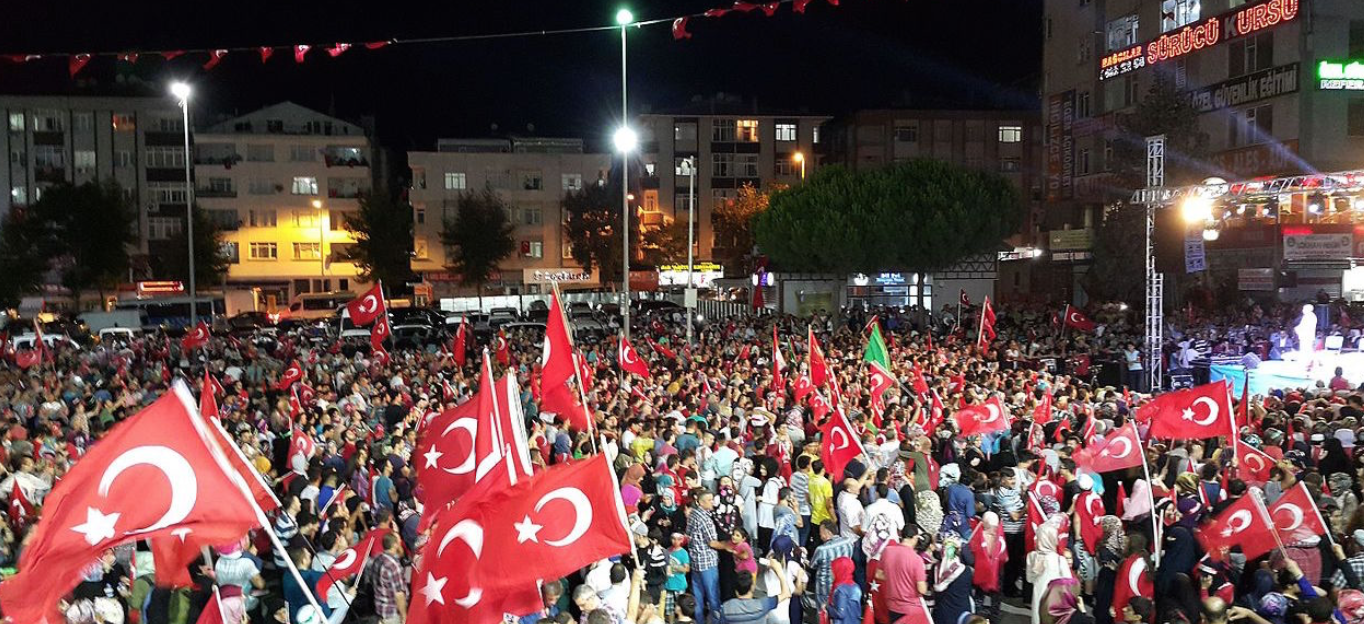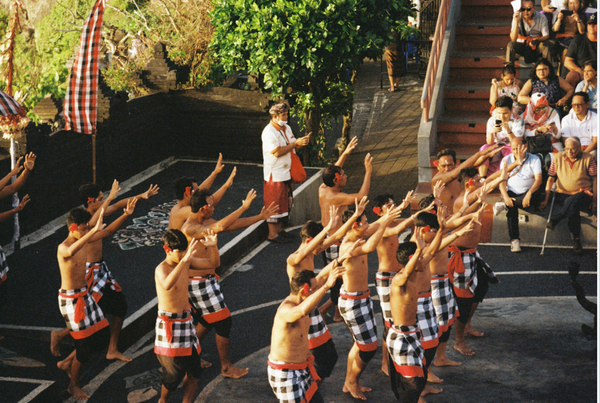Don’t Get Fooled Again: The Triumphs and Pitfalls of State Secularization in Turkey

by GABRIEL DAVIS
Part I: Destabilizing the Old Narrative
We’ll be fighting in the street
With our children at our feet
And the morals that they worship will be gone
And the men who spurred us on
Sit in judgment of all wrong
They decide and the shotgun sings the song
I’ll tip my hat to the new constitution
Take a bow for the new revolution
Smile and grin at the change all around
Pick up my guitar and play
Just like yesterday
Then I’ll get on my knees and pray
We don’t get fooled again [1]
Never in 2016 were The Who’s famous lyrics in “Won’t Get Fooled Again” more apt or applicable than with this summer’s attempted coup in Turkey. With hundreds dead; thousands purged from politics, academia, the military, and the courts; and flagrant nationalism propping up the most stridently Islamist government the republic has seen in years–the “new revolution” has certainly come to pass, and its implications are many.
Yet possibly the most fascinating out was the popular narrative that the coup both created and confirmed of Turkish state secularization as a failed policy. Secularization was an Atatürk-era political tenet that helped westernize Turkey in the tumult of its postwar transition from empire to constitutional republic. Later, it became the organizational matrix by which its military held the regime’s politics in check, and now forms the backbone of the current Turkish system. [2]Nevertheless, it failed to stop the rise of the Justice and Development Party (AKP), a religious faction whose policies starkly contrast with those that secularization was instituted to uphold. The internal fault lines it revealed called the policy itself into question. Western media sources grew fearful: with the marriage of mosque and state, Turkey’s democratic experiment could be finished. [3]
This essay’s goal is to destabilize that narrative. This not only collapses under the actual facts of Turkish history, but also is a Western narrative crafted to anachronistically contextualize Turkish revolts and refocus Middle Eastern policy on the Levant. Asymmetric information between the government’s internal actions and external messages forces Turkey’s ostensible acceptance of this narrative, and provides the West with a false sense of security. In actual fact, I argue, Turkish secularization rises and falls on the auspices of its predominant regime ideology. It is intimately linked to each successive administration, and a closer analysis of the 1960, 1971, 1980, and 1993 coups d’état alongside relevant newspaper clippings and academic articles shows this process of secularization to be a politically fluctuating, rather than permanent, social fixture. 2016’s coup attempt was unique in scope, but its confusing set of motivations are not new to the Turks. It is secularization that beats at the heart of this complicated story, and destabilizing the old narrative lays the theoretical groundwork for a new conception of the republic.
To begin, two types of narratives must be immediately dismissed. The first narratives attribute the coup to the military’s response to Turkish President Recep Tayyip Erdoğan’s ruthless consolidation of power. [4] In the months leading up to July, Erdoğan lobbied to pass constitutional reforms redistributed massive administrative influence to his office. The legal measures he took to amend the constitution, at once emboldening the AKP and expanding their ability to appoint “sympathetic” tribunals, left Turkey’s standing armies with the sparse choice of either caving to the will of Erdoğan’s demands, however religious, or facing dramatic consequences. [5] In effect, Erdoğan’s judicial politicizing legitimized his more direct control of the military. Yet these narratives work only if the legal delegation of power between the state and the military has been historically meaningful–which it has not. The military’s real power has demonstrably superseded that of the state several times. Turkey’s armed forces may respect the constitution, but their secularizing actions across several coups d’état show a fervent institutional commitment to putting implicit principle before tacit law.
A second set of narratives suggests that the July coup was in some way inevitable. These narratives claim that Erdogan’s reactions stemmed from social ideologies that suggested the formation of a radical populace and a repressive state—both of which would exist in opposition. One side would rise against the other, and the resulting turmoil would precipitate a circumstance the likes of which were seen this summer. July’s events, in short, were fated to occur. [6] Again, I reject this interpretation. It is either an intellectually lazy argument or an impossibly difficult argument: the former case disproportionately credits singular events for many diverse actors and actions, painting Turkish society with an inappropriately broad brush, while the latter case requires intimate knowledge of Turkish society: every thought, every speech, every secret meeting that could have produced a coup attempt. None of this information would be possible to find, and in both cases, the impossible amount of evidence required to confirm this theory torpedoes the theory wholesale. The wall into which a car crashes on the highway cannot be used to determine the rationale of the driver. As such, the superficially “inevitable” result of July’s coup cannot be used to determine the politics of all Turkish people.
At this point, then, we are left with a question: on what basis can we theorize Turkish state secularization? As it turns out, the most workable metric by which to evaluate Turkey’s fractured secular history is the string of successful coups themselves. There are four: in 1960, 1971, 1980, and 1997. After discarding the inevitability of Turkey’s coup attempt alongside theories of Erdoğan’s power grab, and using the aforementioned dates, two hypotheses can now be tested out. The first is that state secularization is, indeed, a failed policy. The contents of Turkey’s four coups disprove this quickly. The coup of 1960 unfolded in the crosshairs of political and economic uproar, the last monetary gasps of the Marshall Plan, and resulted in the deposition of Adnan Menderes. That of 1971, generally known as a “coup by memorandum,” pitted military elites against the government they claimed on radio waves had “pushed our country into anarchy, fratricide and social and economic unrest.” [7] Left- and right-wing extremism joined political gridlock to produce the 1980 coup, which upended the regime in favor of temporary technocratic rule. And the 1997 coup, reminiscent of the coup by memorandum, forced the government to disband after the military threatened it for its political shift toward Islamism. Though the issues were diverse, their motivation—to preserve Atatürk’s constitutional state—was universal, and one can trace wariness of religion back through all of these incidents. Whether the overt Islamism that precipitated the 1997 coup, the indirect religious motivations that fed domestic terrorism in 1980, or the embedded political concerns that found their roots in religion, the motivations of Turkey’s past coups show a clear military awareness of, if not explicit response to, the preservation of secularism.
The second explanation is that state secularization is alive and well—counteracting, even today, the excesses of religious extremism that threaten to topple Turkey’s avant-garde regime. To poke holes in this hypothesis, however, one need not look farther than the summer of 2016. There, the military by and large found itself subduing insubordinate soldiers while actively serving on the AKP’s behalf to protect Islamist principles. One fell swoop of institutional rebelliousness sent army loyalists into the street to uphold a democratic, albeit stridently religious, government. That the army can act by and large independently of the parliament is besides the point [8]. That the army may have been defending the institution of the government, rather than the people who currently run it, is also besides the point. In that moment, thousands of soldiers, whom society expected to protect secularization, crippled the only group that seemingly tried to stop Erdoğan’s unflinching moves towards autocracy. For all we know, these coup plotters wanted to re-secularize the regime as well. The morning of July 16 saw a quasi-traditional Islamic party still at the helm of Turkish politics. Whether intentionally or not, the military was every bit as complicit in sustaining this reality as if they had acted on Erdoğan’s behalf. While pro-AKP Turks overflowed post-coup attempt rallies in Istanbul, state secularization, allegedly alive and well, collected dust. [9]
Neither specific conjectures about the coup attempt or Erdoğan’s legal pursuits nor binary views of state secularization can perfectly explain state secularization in Turkey’s present context. From a macro point of view, certain conjectures come closer than others, but a close explanation reveals much more nuance than popular models can predict—after all, the military cannot always channel the will of the government, and the July coup attempt did not necessarily channel the will of the people. What arises in place of these theories is a picture of state secularization in freefall—buoyed up through military intervention and popular sentiment in one moment, and left to fade against an increasingly religious political tableau in the next. It is, in fact, exactly this conception of state secularization that most aptly depicts the historical and contemporary situation in the Turkish republic. It has never been a permanent Turkish fixture, and neither has it been wholly absent. Constituted and enacted by Turkey’s leaders, state secularization has grown and shrunk at the hand of Turkey’s predominant regime ideology, the ripple effects of which reach as far as quotidian Turkish society. In 2016, the “failed secularization” narrative blossoms anew, not only because the coup attempt revives it, but because its current regime actively accepts and perpetuates it: it is part of Turkey’s external policy towards the West. Only from this combination of events can state secularization be understood as, in the same breath, both a critical Turkish idea and a tremendous political deception.
This understanding of state secularization in the Turkish regime enables a fresh analysis of not only the coup attempt itself, but also the sprawling social, political, and historical circumstances in which it is inscribed. Beginning here, I intend to undertake this analysis in three successive parts. The first part, forthcoming in the winter, will further situate the theory here established within the context of Erdoğan’s rise to power. The second part will examine non-Western governmental narratives of Turkey to show how they, too, are problematic, as well as the role the Turkish people play in this process. Finally, the third part will integrate the reaction of the Turkish government after the coup attempt into the political theory I have set forth, and explore its broader ideological implications for Turkish society.
[1] “THE WHO LYRICS – Won’t Get Fooled Again,” AZLyrics, June 25, 1971, accessed November 26, 2016, http://www.azlyrics.com/lyrics/who/wontgetfooledagain.html.
[2] Bülent Daver, “Secularism in Turkey,” Atatürk Araştırma Merkezi, accessed November 26, 2016, http://www.atam.gov.tr/dergi/sayi-11/secularism-in-turkey.
[3] “‘We are a Muslim country’: Turkey’s parliament speaker advocates religious constitution,” RT, April 26, 2016, accessed November 24, 2016, https://www.rt.com/news/340937-turkey-secular-constitution-dropped/.
[4] Andrew Finkel, “Turkey was already undergoing a slow-motion coup – by Erdoğan, not the army,” The Guardian, July 16, 2016, accessed November 26, 2016, https://www.theguardian.com/commentisfree/2016/jul/16/turkey-coup-army-erdogan.
[5] Steven Cook, “How Erdogan Made Turkey Authoritarian Again,” The Atlantic, July 21, 2016, accessed November 25, 2016, http://www.theatlantic.com/international/archive/2016/07/how-erdogan-made-turkey-authoritarian-again/492374/.
[6] Robert Fisk, “Turkey’s coup may have failed – but history shows it won’t be long before another one succeeds,” The Independent, July 16, 2016, accessed November 16, 2016, http://www.independent.co.uk/voices/turkey-coup-erdogan-ankara-istanbul-military-army-turkey-s-coup-may-have-failed-but-history-shows-a7140521.html.
[7] Lily Rothman, “A Short History of Modern Turkey’s Military Coups,” TIME, July 15, 2016, accessed November 26, 2016, http://time.com/4408850/turkey-coup-history/.
[8] Ibid.
Works Cited
Cook, Steven. “How Erdogan Made Turkey Authoritarian Again.” The Atlantic, July 21, 2016. Accessed November 25, 2016. http://www.theatlantic.com/international/archive/2016/07/how-erdogan-made-turkey-authoritarian-again/492374/.
Daver, Bülent. “Secularism in Turkey.” Atatürk Araştırma Merkezi. Accessed November 26, 2016. http://www.atam.gov.tr/dergi/sayi-11/secularism-in-turkey.
Finkel, Andrew. “Turkey was already undergoing a slow-motion coup – by Erdoğan, not the army.” The Guardian, July 16, 2016. Accessed November 26, 2016. https://www.theguardian.com/commentisfree/2016/jul/16/turkey-coup-army-erdogan.
Fisk, Robert. “Turkey’s coup may have failed – but history shows it won’t be long before another one succeeds.” The Independent, July 16, 2016. Accessed November 16, 2016. http://www.independent.co.uk/voices/turkey-coup-erdogan-ankara-istanbul-military-army-turkey-s-coup-may-have-failed-but-history-shows-a7140521.html.
Naylor, Hugh. “With Turkey in chaos, its secular citizens feel even more nervous.” Washington Post, July 19, 2016. Accessed November 22, 2016. https://www.washingtonpost.com/world/middle_east/with-turkey-in-chaos-its-secular-citizens-feel-even-more-nervous/2016/07/19/8dd37dd8-4d31-11e6-bf27405106836f96_story.html.
Pamuk, Humeyra, and Nick Tattersall. “Turkey’s Erdogan stages mass rally in show of strength after coup attempt.” Reuters, August 9, 2016. Accessed November 27, 2016. http://www.reuters.com/article/us-turkey-security-idUSKCN10I0CZ.
Rothman, Lily. “A Short History of Modern Turkey’s Military Coups.” TIME, July 15, 2016. Accessed November 26, 2016. http://time.com/4408850/turkey-coup-history/.
“THE WHO LYRICS – Won’t Get Fooled Again.” AZLyrics. June 25, 1971. Accessed November 26, 2016. http://www.azlyrics.com/lyrics/who/wontgetfooledagain.html.
“‘We are a Muslim country’: Turkey’s parliament speaker advocates religious constitution.” RT, April 26, 2016. Accessed November 24, 2016. https://www.rt.com/news/340937-turkey-secular-constitution-dropped/.
Photo: Maurice Flesier





